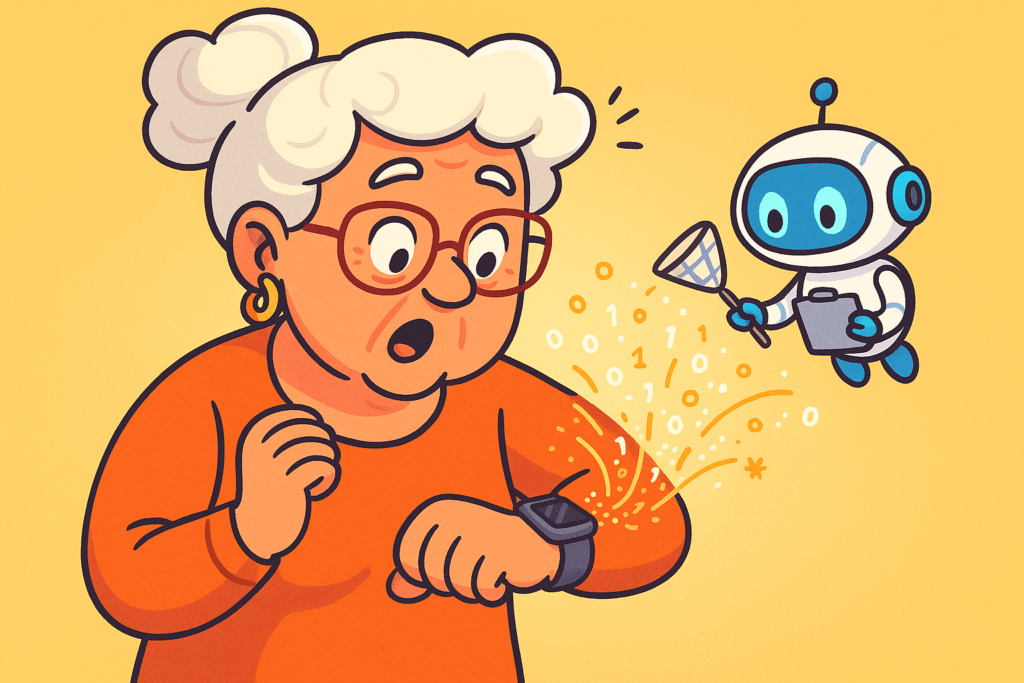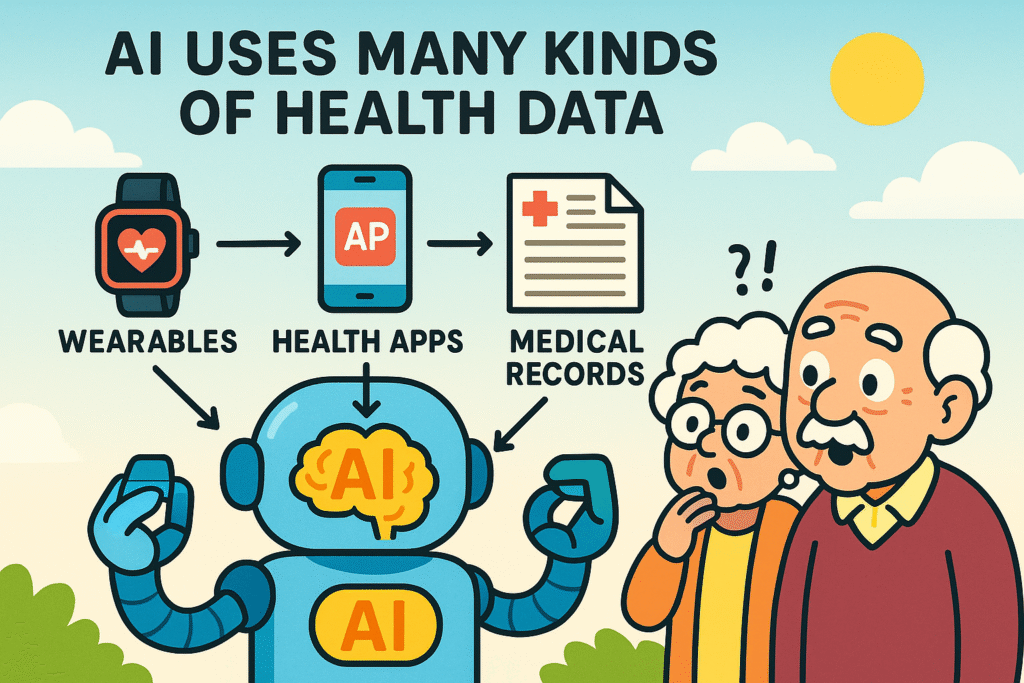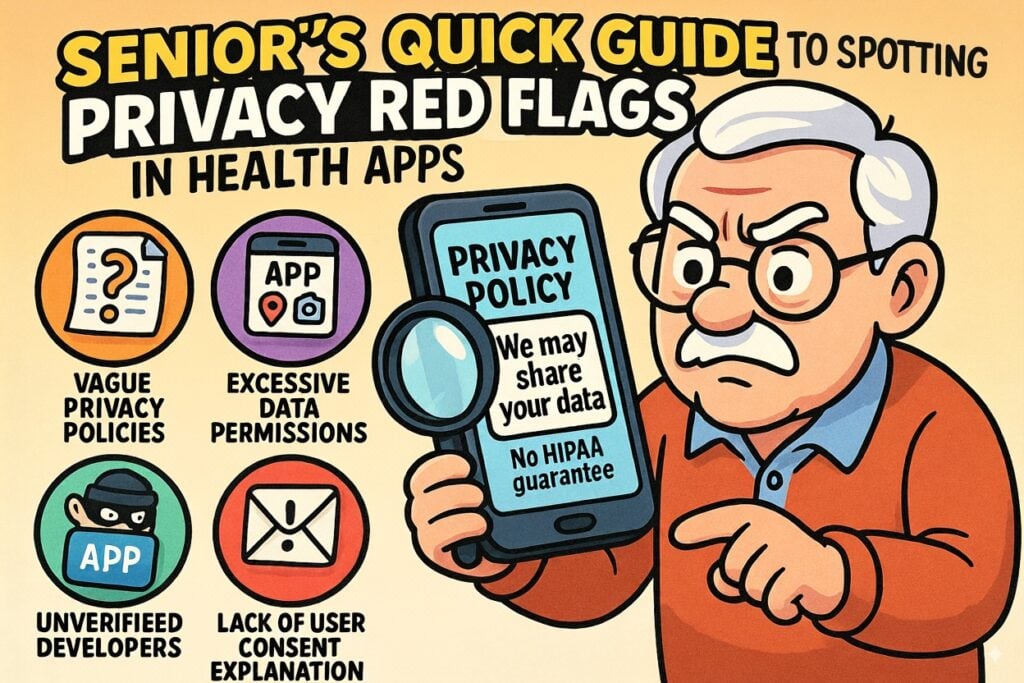
Newsletter Subscribe
Enter your email address below and subscribe to our newsletter


I recently got one of those fancy smartwatches. You know the kind. It tracks my steps, tells me I’m sleeping like a teenager (a blatant lie), and occasionally congratulates me for standing up. It’s like having a tiny, optimistic fitness coach strapped to my wrist.
But the other day, as it buzzed to tell me my heart rate was “excellent for my age bracket,” a thought crossed my mind:
This little gizmo knows more about my ticker than my first spouse did. And it’s connected to the internetThe Internet is a vast network of computers and other electronic devices connected globally, allowin... More. Who else is it telling?
If you’ve ever had a similar thought, you’re not alone. We’re living in an age where technology can do wonders for our health, but it also feels a bit like we’ve invited a very nosy, very smart robot into our lives.
That robot is often powered by Artificial Intelligence, or AI. Let’s pull back the curtain on this AIArtificial Intelligence (AI) is basically when computers get smart—really smart. Imagine if your c... More character, figure out what it’s doing with our health information, and learn how to make sure our private business stays private.
Before we can become privacy experts, we need to get a handle on a few key ideas. Don’t worry, there’s no test, and I’ll be using small words.
Forget about the evil robots in movies. In the real world, AI is just a very clever computer program. Think of it like a brilliant student who can read a million books in a second and then use that knowledge to spot patterns.
When it comes to your health, AI can look at the data from your smartwatch—your heart rate, sleep patterns, activity levels—and compare it to information from thousands of other people.
It learns what’s normal, what’s not, and can even offer suggestions, like, “Maybe take the stairs today, champ.”
When we hear “health data,” we usually think of the dusty file folder at our doctor’s office. But in the digital age, it’s a whole lot more. It includes:

You’ve probably heard of HIPAA, the law that keeps your doctor from discussing your gallbladder surgery at a cocktail party.
It’s a fantastic privacy protection for the information shared between you and your healthcare providers (doctors, hospitals, insurers).
Here’s the catch: HIPAA’s protective umbrella often doesn’t cover consumer health apps and wearables.
The company that made your new step-counting app? They might not be bound by HIPAA at all. That means the data you give them plays by a different set of rules—their rules.
Once you click “agree” on a new health app, your data starts a journey. It zips from your phone or watch over the internet to the company’s computers, where their AI gets to work.
But what is it actually doing?
Your data isn’t just sitting in a digital filing cabinet. AI puts it to use in several ways, some of which are incredibly helpful and some… less so.
Losing control of your data isn’t just an annoyance; it can have real consequences. It’s important to be aware of the risks without being afraid.
Okay, enough with the scary stuff. The good news is that you are in the driver’s seat.
With a few simple habits, you can take control of your health data and enjoy the benefits of technology without giving up your privacy.
I know, I know. Reading a privacy policy sounds about as fun as watching paint dry. But you don’t have to read every word. Just scan for a few key phrases:
Bonus Tip: Copy and paste the privacy policy into ChatGPTChatGPT is an advanced language model developed by OpenAI, designed to understand and generate human... More and ask it to identify any red flags or concerning clauses in the policy. You can even ask it specifically about the items above and to summarize its findings.
When you install a new app, it asks for permission to access parts of your phone, like your contacts, location, or microphone. Be a bouncer at the door of your phone. Ask yourself, “Does this app really need this?”
A heart rate monitor app probably doesn’t need access to your contact list. A walking app might need your location to map your route, but does it need it all the time, or only when you’re using the app? Go into your phone’s settings and review these permissions.
A little bit of healthy skepticism goes a long way. Keep an eye out for these warning signs that an app might not have your best interests at heart.

Not at all. Many reputable apps have strong privacy policies. The key is to do a quick check before you commit. A few minutes of reading can save you a lot of worry later.
Nope. AI is just a tool. A hammer can be used to build a house or break a window. The same goes for AI—it all depends on the rules and ethics of the company using it.
Be selective. Don’t download"Download" means saving something from the internet onto your device—like your phone, tablet, or c... More every health app that looks interesting. Stick to well-known, trusted companies, and always take 60 seconds to review the permissions it asks for.
Not necessarily. Some free apps are excellent, and some paid apps have sloppy privacy practices. A price tag doesn’t guarantee security.
Your doctor’s office is still held to the high standards of HIPAA. The information in your official medical record is very secure. These concerns are mostly for the consumer gadgets and apps you choose to use on your own.
That little computer on your wrist can be a wonderful partner in your health journey. It can motivate you, inform you, and maybe even help catch a problem early.
The goal isn’t to ditch the technology and go back to the dark ages. The goal is to use it wisely.
By understanding what AI is, where your data goes, and how to set your own boundaries, you get to enjoy all the benefits of modern health tech while keeping your private information exactly that—private.
You are in control. Now, if you’ll excuse me, my watch says it’s time for me to stand up.